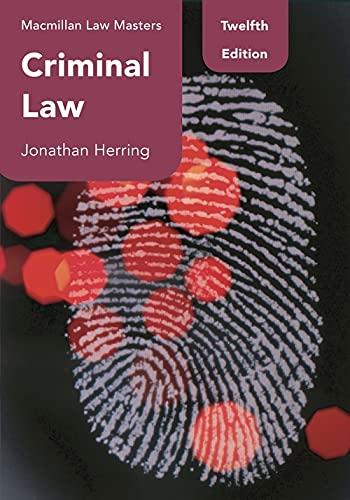Question
Multiple Choice (No explanation needed) #1. A, B and C are co-owners of an undivided parcel of land. A sold his 1/3 share to B.
Multiple Choice (No explanation needed)
#1.
A, B and C are co-owners of an undivided parcel of land. A sold his 1/3 share to B. Which is correct?
- C may exercise his right of redemption within 40 days
- C may exercise his right of redemption by operation of law
- The deed of sale is unenforceable because it is unauthorized
- C cannot exercise the right of redemption since the sale was made to a co-owner
#2.
I. The vendee is bound to accept delivery and to pay the price of the thing sold at the time and place stipulated in the contract.
II. The very essence of a contract of sale is the transfer of ownership in exchange for a price paid or promised.
- Both are true
- Only II is true
- Only I is true
- Both are false
#3.
S and B entered into a contract whereby S transferred to B a specific car for the price of P200,000.00, while B gave to S P90,000.00 cash and a diamond ring worth P110,000.00. The heading of the written contract reads, "Contract of Sale."
- The contract is a valid contract of barter since the value of the property is more than the monetary consideration. the intention of the parties is immaterial.
- The contract is partlya contract of barter and partly a contract of sale.
- The contract is a valid contract of sale as intended by the parties regardless of whether the monetary consideration is more or less than the value of the property consideration.
- The contract is void because the intention of theparties is void since the value of the diamond ring is more than the monetary consideration given.
#4.
I. The redhibitory action, based on the faults or defects of animals, must be brought within six months from the date of their delivery to the vendee.
II. If the animal should die within five days after its purchase, the vendor shall be liable if the disease which caused the death existed at the time of the contract.
- Only II is true
- Both are true
- Both are false
- Only I is true
#5.
I. If the vendee is placed in actual possession of the property, but by agreement of the parties ownership of the same is retained by the vendor until the vendee has fully paid the price, the mere transfer of the possession of the property subject of the sale is not the "delivery" contemplated in the Law on Sales.
II. Presumptive delivery via execution of a public instrument is negated by the reality that the vendee actually failed to obtain material possession of the land subject of the sale.
- Both are true
- Only I is true
- Both are false
- Only II is true
#6.
I. If several person, jointly and in the same contract, should sell an undivided immovable with a right of repurchase, none of them may exercise this right for more than his respective share.
II. If several persons, jointly and in the same contract, should sell an undivided immovable with a right of repurchase, the vendee may demand of all the vendors or co-heirs that they come to an agreement upon the repurchase of the whole thing sold; and should they fail to do so, the vendee cannot be compelled to consent to a partial redemption.
- Both are false
- Only I is true
- Both are true
- Only II is true
#7.
The seller cannot avail himself of the right of repurchase without returning to the vendee, except:
- the price of the sale
- the expenses of the contract
- the necessary and useful expenses made on the thing sold
- interest
#8.
A offered for sale to B 20 cavans of XYZ rice and fixed the price per cavan at P100 over the price offered at W's store in Z Public Market. The price is:
- Not certain so the court may fix the price.
- Certain because there is a price ceiling for price of rice.
- Certain because it has got reference to another thing which is certain
- Not certain because the price at Z Public Market is not stated.
#9.
I. In a contract of sale, the object is property.
II. In assignment of credit, the object is credit, incorporeal rights or rights of action.
- Both are true
- Only I is true
- Only II is true
- Both are false
#10.
I. All persons, whether natural or juridical, who can bind themselves, have legal capacity to enter into a contract of sale.
II. Where necessaries are those sold and delivered to a minor or other person without capacity to act, he must pay a reasonable price therefor.
- Only II is true
- Only I is true
- Both are false
- Both are true
#11.
S sold to B in a deed of sale his parcel of land. Afterwards, S sold the same land to C in another deed of sale who was aware of the sale to A. B thereafter took possession thereof and registered the sale in his name. The parcel of land shall belong to:
- B, because he was the first possessor of the land
- B, because the sale to him was through deed of sale
- B, because he first registered the sale in his favor
- A, because he has the oldest title
Step by Step Solution
There are 3 Steps involved in it
Step: 1

Get Instant Access to Expert-Tailored Solutions
See step-by-step solutions with expert insights and AI powered tools for academic success
Step: 2

Step: 3

Ace Your Homework with AI
Get the answers you need in no time with our AI-driven, step-by-step assistance
Get Started


